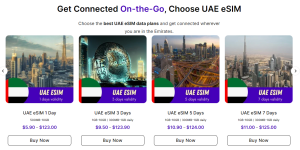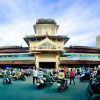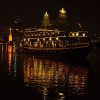Best time to visit Dubai – Your pocket guide
Dubai has become a shining jewel in the desert, attracting millions of visitors from around the globe each year. The remarkable skyline, opulent shopping centers, and vibrant culture come together to create an experience that is nothing short of magical. When planning your trip, one of the most crucial factors to consider is timing. The best time to visit Dubai can significantly impact not only your travel itinerary but also your overall enjoyment. This guide aims to provide you with valuable insights on when to visit Dubai, what to pack for your trip, how to stay connected to ensure you have a memorable journey.

1. What is the best time to visit Dubai?

The best time of year to visit Dubai is from November through March. This period is considered the peak travel season, but it provides the most pleasant weather conditions for enjoying all that Dubai has to offer.
During these months, the days have clear blue skies with temperatures ranging from a mild 20 to 25 degrees Celsius. The evenings are even cooler, making outdoor sightseeing and activities very comfortable. In comparison, April through October bring extremely hot and humid weather that can deter visitors from exploring Dubai to its fullest. The peak season also coincides with major annual festivals like the Dubai Shopping Festival and Dubai Marathon.
Taking place in December-January and January-February respectively, these events infuse the city with lively celebrations and unique cultural experiences. While the peak months may see slightly larger crowds, the atmospheric festivals are well worth experiencing. Additionally, the moderate climate makes shopping indoors at Dubai’s opulent malls much more enjoyable than battling the scorching heat of the off-season.
In conclusion, selecting the best time to visit Dubai largely depends on your interests and comfort levels. Whether you prioritize pleasant weather, cultural experiences, or budget-friendly options, there is a time that fits your needs. I recommend visit Dubai and the UAE from Novmber through March.
2. What to pack for the UAE trip
Packing for Dubai requires careful consideration of the region’s climate, cultural norms, and recreational activities. By bringing the right items, you can ensure a comfortable and enjoyable trip.
Clothing:
- Lightweight, loose fitting clothes in breathable fabrics like cotton for the hot weather. Shorts, t-shirts, dresses.
- Light sweater/jacket – evenings can get cooler.
- Modest clothing that covers knees and shoulders if visiting mosques or conservative areas.
- Comfortable shoes like sneakers.
- Swimsuit.
- Hat and sunglasses.
Toiletries:
- Sunscreen, lip balm with SPF. UAE has very strong sun.
- Prescription medicines if needed.
- Hand sanitizer as hand washing facilities may be limited in some areas.
Others:
- Passport and documentation needed for entry like visa.
- Spending money – UAE dirham cash and debit/credit cards.
- Camera.
- Chargers and adapters – voltage is 220V.
- Traditional modest outfit like abaya/kandura if visiting cultural areas.
- Reusable water bottle.
- Lightweight jacket/sweater for AC indoors or cooler evenings.
- Electronics like laptop if needed but voltages differ – check before packing.
Communication:
- Local SIM card for data and calling – prices are reasonable
- Alternatively set up an eSIM for data-only connectivity on compatible device. I would highly recommend getting an eSIM plan from uaeesim.com, esimdubai.com, gigago.com,… if you plan to visit Dubai or other parts of the UAE. As someone who has used their services before, I found the eSIM plans from uaeesim.com to be extremely convenient and good value for staying connected.

3. Final thoughts
Arriving at the end of your trip should give you time to reflect on your experiences and prepare for any potential challenges during your travel. This section will offer tips and reminders to help ensure your journey is smooth and hassle-free.
Safety tips
Dubai is known for being one of the safest cities globally, but it is always prudent to exercise caution. Familiarize yourself with local laws and customs, as the UAE has strict regulations regarding behavior and dress code. Avoid public displays of affection and respect local traditions, especially during Ramadan when fasting is observed.
Additionally, keep an eye on your belongings in crowded areas and always opt for authorized transport services when traveling within the city. Familiarizing yourself with emergency contact numbers and knowing where to seek assistance can also add peace of mind during your visit.
Navigating transportation options
Dubai boasts an extensive public transportation system, making it easy to get around the city. The metro is efficient and budget-friendly, connecting key tourist hotspots. Taxis and ride-sharing apps like Careem are also widely available for those preferring door-to-door service.
Consider getting a Nol Card, a rechargeable smart card that provides seamless access to various modes of transport, including buses, trams, and water taxis. Using a Nol Card allows you to save time and money during your travels.
Embracing local culture
Make the most of your Dubai experience by immersing yourself in local culture. Don’t shy away from trying authentic Emirati cuisine, visiting historical sites like Al Fahidi Fort, and participating in traditional events. Engaging with locals or joining guided tours can also enrich your understanding of the city and its heritage.
Being open and respectful toward local customs will undoubtedly enhance your travel experience and leave you with lasting memories of Dubai.








